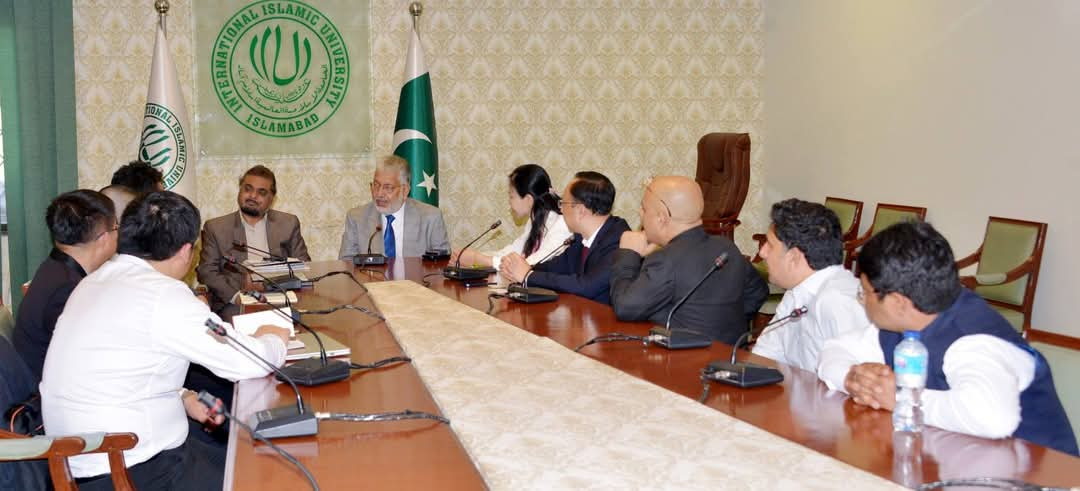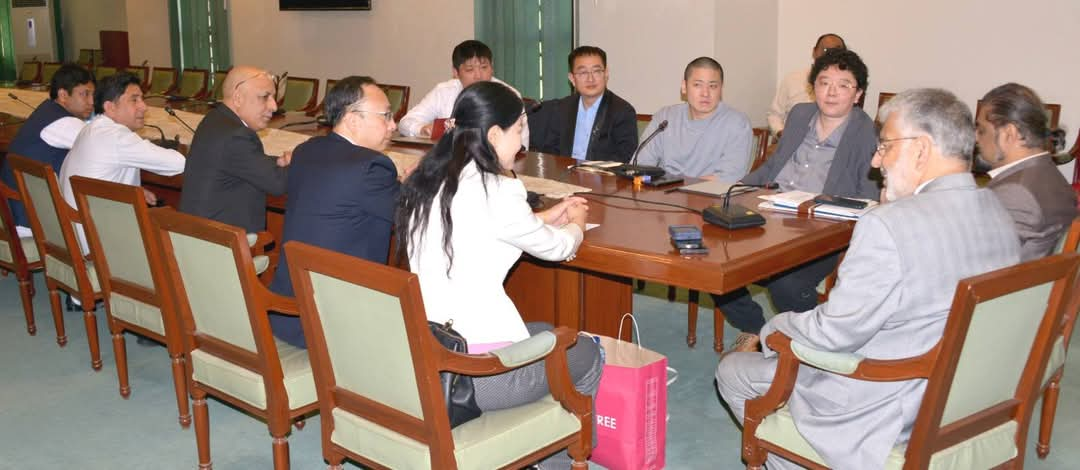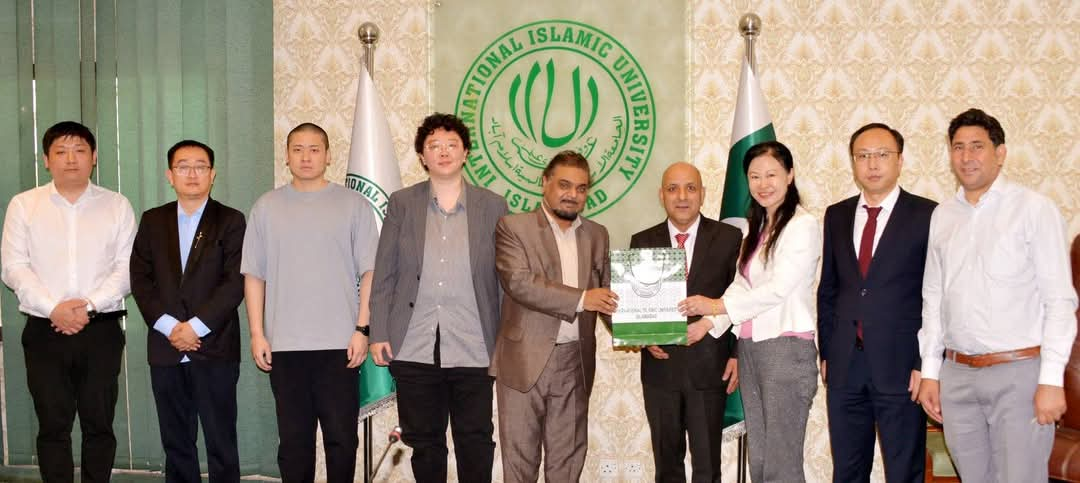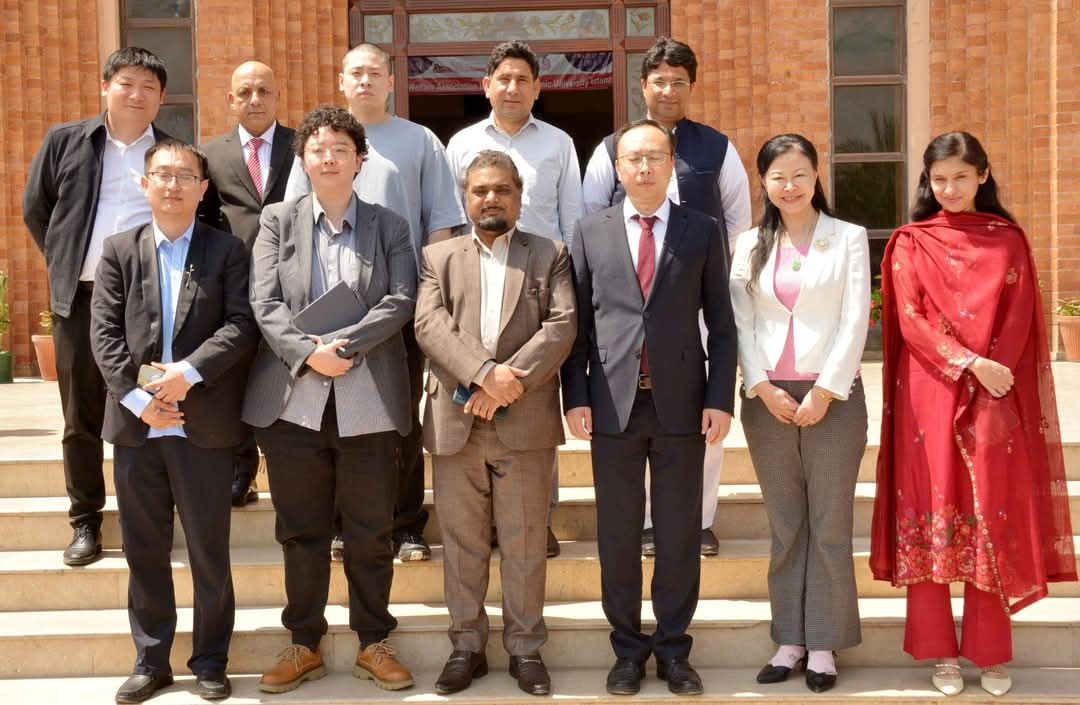 A high-level Chinese delegation comprising senior executives and leading scientists from renowned biotechnology, medical equipment, and pharmaceutical companies visited the International Islamic University, Islamabad (IIUI), to explore long-term collaboration in biotechnology, diagnostics, medical equipment manufacturing, vocational training, and research commercialization.
A high-level Chinese delegation comprising senior executives and leading scientists from renowned biotechnology, medical equipment, and pharmaceutical companies visited the International Islamic University, Islamabad (IIUI), to explore long-term collaboration in biotechnology, diagnostics, medical equipment manufacturing, vocational training, and research commercialization.
Reflecting the shared commitment of Pakistan and China to advancing educational and technological diplomacy, the visit aligns with Pakistan’s Vision 2025 and China’s innovation-driven global outreach strategies.
The delegation included representatives from China Medical City’s CPEC Medical Development and Research Office, Guangzhou Youdi Testing Kits Manufacture Co., Zhongshan Medical Manufacture Co., Yao Hai Medical Co., and the China People’s Reforming Party, Shanghai.
 In their meeting with IIUI’s leadership — Rector Dr. Mukhtar Ahmed and President Dr. Ahmed Shuja Syed — the Chinese experts proposed the establishment of a joint facility for the production of medical diagnostic kits, particularly for diseases such as Hepatitis C and HIV/AIDS. The proposal envisions technology transfer, local manufacturing under the theme “Made in Pakistan with Chinese Innovation”, and the establishment of a dedicated biotechnology laboratory within IIUI’s emerging Science and Technology Innovation Zone.
In their meeting with IIUI’s leadership — Rector Dr. Mukhtar Ahmed and President Dr. Ahmed Shuja Syed — the Chinese experts proposed the establishment of a joint facility for the production of medical diagnostic kits, particularly for diseases such as Hepatitis C and HIV/AIDS. The proposal envisions technology transfer, local manufacturing under the theme “Made in Pakistan with Chinese Innovation”, and the establishment of a dedicated biotechnology laboratory within IIUI’s emerging Science and Technology Innovation Zone.
Rector IIUI praised China’s leadership in technology and innovation and expressed optimism that this partnership would open new avenues for knowledge-sharing, capacity building, and joint ventures between IIUI and leading Chinese industries.
 President IIUI emphasized that the university’s Office of Research, Innovation and Commercialization (ORIC), International Linkages Office, and Science and Technology spaces were well-positioned to facilitate this collaboration. He reiterated IIUI’s commitment to meaningful research translation where ideas move beyond academic publication to tangible products and solutions for society.
President IIUI emphasized that the university’s Office of Research, Innovation and Commercialization (ORIC), International Linkages Office, and Science and Technology spaces were well-positioned to facilitate this collaboration. He reiterated IIUI’s commitment to meaningful research translation where ideas move beyond academic publication to tangible products and solutions for society.
Discussions also explored the formation of joint research teams, product incubation, patent registration, and vocational training programs to equip Pakistani youth with biotech skills aligned with future industry needs. President IIUI further proposed that IIUI could serve as a host platform for research labs, youth training centres, and regional vocational campuses in Lahore and Peshawar to support the growing biotech ecosystem in Pakistan.
The Chinese delegation expressed appreciation for IIUI’s research infrastructure and identified the university as a promising strategic partner in advancing health technologies within the broader China-Pakistan cooperation framework.
 It was mutually agreed that a pilot project for diagnostic kits production will be initiated, collaborative research teams will be formed, a business incubation facility will be developed at IIUI, and regulatory alignment will be ensured with DRAP (Pakistan) and relevant Chinese authorities. Dual product registration mechanisms will also be explored for Pakistan and China, while joint research centers will be established to foster sustained scientific collaboration.
It was mutually agreed that a pilot project for diagnostic kits production will be initiated, collaborative research teams will be formed, a business incubation facility will be developed at IIUI, and regulatory alignment will be ensured with DRAP (Pakistan) and relevant Chinese authorities. Dual product registration mechanisms will also be explored for Pakistan and China, while joint research centers will be established to foster sustained scientific collaboration.
Importantly, both sides agreed that once the operational frameworks are finalized and formal MoUs are signed, the Government of Pakistan will also be taken on board. This will help further strengthen the production, dissemination, and policy-level support for the collaborative technologies being developed. It is envisioned that this multi-stakeholder engagement — involving academia, industry, and government — will accelerate innovation and improve healthcare outcomes in the region.
Another key highlight of the meeting was the proposal that patents already reaching maturity in China could have their application patents made available in Pakistan. This strategic sharing of intellectual property would enable faster adaptation and localization of cutting-edge biotech products in the Pakistani market.
A working group will be constituted to prepare detailed action plans and implementation roadmaps, with phased activities expected to commence in the latter half of 2025.
The meeting was also attended by Professor Dr. Muhammad Riaz from SA-CIRBS, who served as the meeting coordinator.

